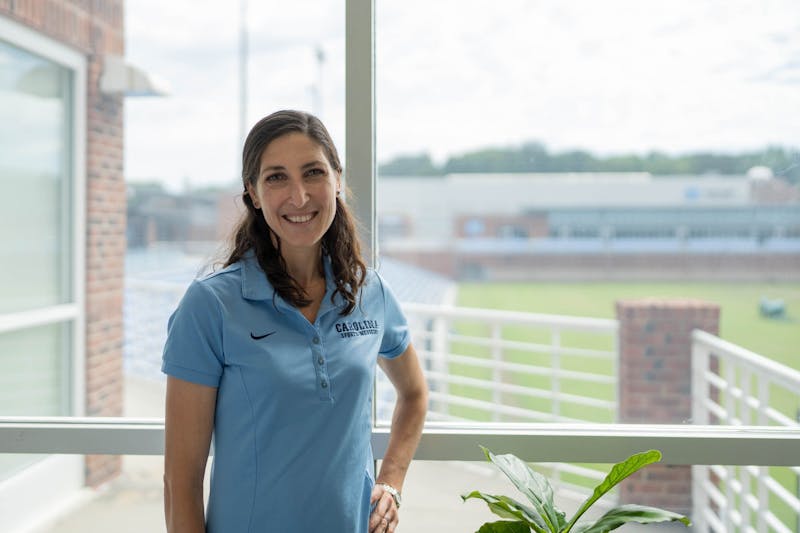Jeni Shannon’s work with UNC athletes highlights importance of mental health resources
Growing research supports the importance of sports psychology, especially in sports schools and programs with high performance expectations.
At UNC, a Power Five school that keeps every team at a nationally competitive level, establishing mental health programs for athletes is especially critical to their overall well-being.
Jeni Shannon, director of the mental health and performance psychology program at Carolina Athletics, is one of three full-time providers at UNC, pioneering the athletic department’s approach to sports psychology. Shannon, alongside Brendan Carr and Bradley Hack, is developing programs to help fight mental illness within the UNC athletic community.
When Shannon was a senior in high school, a career-ending injury took her away from the world of competitive gymnastics and turned to coaching. An undergraduate course at the University of Arizona called “The Psychology of Excellence” exposed her to the field of sports psychology, and she noticed its relevance through her own experience in sports and her time with the players.
While Shannon acknowledges that UNC offers “an exciting sports culture to be a part of,” she is also aware of the impact of high athletic expectations coupled with academic rigor.
“I think the flip side can be (that) it’s a lot of pressure and you’re very public at times,” Shannon said. “There are a lot of expectations. It’s a tough life, really.
The impact of Shannon and her colleagues’ work in the sports space reveals a key oversight in the field of sports medicine when it comes to mental health, especially in light of the COVID-19 pandemic.
Rising senior volleyball player Parker Austin saw life as an athlete at UNC before and after COVID-19, and said being an athlete during the pandemic was an isolating experience.
“It’s this endless cycle of waking up, working out, working out, coming home, showering and going to bed,” Austin said. “It’s just this chronic cycle where you’re kind of stuck in and you don’t leave your room, and you just don’t see other people. It affected me a lot.”
AMP has grown exponentially over the past few years, growing from one to three full-time providers. According to Shannon, the majority of the work she and her colleagues do involves interacting with athletes one-on-one, but there are also many new initiatives that aim to incentivize more peer leadership within sports teams. themselves.
UNC head coach Karen Shelton said Shannon’s work with her team was “remarkable.”
Shannon hosts weekly 30 minute meetings with the team, providing a safe space to discuss topics such as sports performance and social and team issues.
“It gives everyone a role on the team,” Shelton said. “Whatever your position, you have a voice. I think that’s one of the most important things, but also performance. If you don’t have a good game, have a tool or something you can think of that can get you back inside.
Shannon works directly with a number of sports teams at UNC through sessions, outreach, and programs. She says there is also a new emphasis on training coaches so they can be better equipped when mental health issues arise within their teams.
Another major aspect of integrating sports psychology into UNC’s Department of Sports Medicine is the effort to de-stigmatize the discussion around performance issues and stress.
“Mental health is health,” Shannon said. “It’s not separate from, it’s just part of your health. I think one of the most important things we can do is approach it like we do physical health. Ask the coaches to mention it and talk about it Ask coaches and team doctors to check your mental health as well as your physical health Ask athletes to be willing to talk to each other.
By ensuring players are comfortable discussing mental health issues with their coaching staff and peers, Shannon and her team can collectively develop a safer space for athletes at UNC.
While AMP is growing, three full-time providers may not be enough for a large population of athletes. Some have expressed concern that the number of providers does not match the increased demand for mental health services.
“It’s so great to see UNC as a whole starting to de-stigmatize mental health,” said UNC women’s soccer volunteer assistant and rising junior Madi Pry. “We are having more conversations about it and encouraging people to get help. But again, we have three full-time sports psychologists for over 800 athletes, which of course will create waiting lists.
The presence of a long waiting list, however, highlights the importance of Shannon’s work in the UNC sports community and shows that AMP is a program that UNC should continue to grow.
“The influence they have on athletes, current, past and future, is going to be huge,” Austin said. “I’m just excited to see how it continues to grow and how it can continue to help students because it really is so important.”
Shelby Swanson contributed reporting for this story.


Comments are closed.